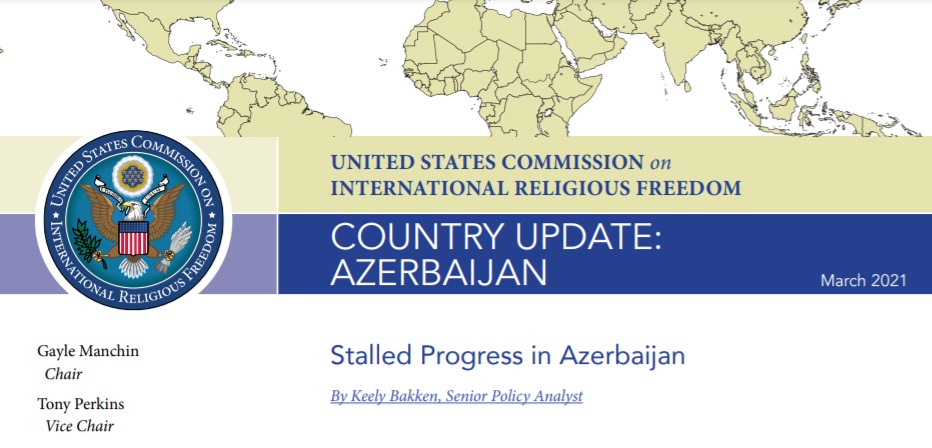in Russian – https://aga-tribunal.info/uscirf-18-3-2021/
Source: https://www.uscirf.gov/ March 18, 2021
The U.S. Commission on international religious freedom (USCIRF) every year issues reports about 29 countires. Among them there are 6 ex-Soviet countries: Azerbaijan, Kazakhstan, Russia, Tajikistan, Turkmenistan, Uzbekistan, as wel as Turkey, another 14 countries from Asia, 6 from Africa, also Cuba and Nicaragua.
USCIRF is an independent, bipartisan, U.S. federal government commission created by the 1998 International Religious Freedom Act (IRFA) that monitors the universal right to freedom of religion or belief abroad. USCIRF uses international standards to monitor religious freedom violations globally, and makes policy recommendations to the President, the Secretary of State, and Congress.
On March 18, 2021 USCIRF issued an update on Azerbaijan: “Stalled Progress in Azerbaijan” by Keely Bakken, Senior Policy Analyst. This report evaluates trends relevant to freedom of religion or belief in Azerbaijan since USCIRF commissioners and staff traveled to the country in early 2020… This country update also details the many obstacles posed by mandatory registration and other restrictions on religious communities, the continued imprisonment of religious activists, and recent violations committed in the context of the renewed conflict over Nagorno-Karabakh.
An updated report was signed by 20 names, in that number Danielle Ashbahian, Senior Communications Specialist.
Below we present last two paragraphs of 5 pages document.
This report by USCIRF was in March 2021, but only at the beginning of February there were many dozens of testimonies, appeals and reports on the numerous damages committed by Azerbaijan against the Christian Armenian heritage. Part of it was presented here at https://aga-tribunal.info/christian-heritage-1/
Thus this report is another example of how the soft language of USCIRF with minimized criticism on Azerbaijan in fact works as a direct encouragement of the ongoing cultural genocide againt Armenian Christian and cultural heritage.
Nagorno-Karabakh Conflict
September 2020 saw the renewal of violent conflict between Armenia and Azerbaijan over Nagorno Karabakh and surrounding territories. During the course of fighting in October, Armenia accused Azerbaijan of purposefully shelling the Ghazanchetsots Cathedral in the city of Shusha. According to reports, the cathedral was hit twice by precision missile strikes that severely damaged the roof and interior of the building. In December, Human Rights Watch concluded that the attack was intentional, constituting a war crime that should be investigated and prosecuted. Azerbaijan claimed that Armenian forces also damaged religious sites as a result of recent shelling.
The announcement of a ceasefire in early November formalized the territorial gains Azerbaijan had made militarily, and it set a staggered timeline for the cession of additional territories to Azerbaijan—raising concerns about the protection of various churches, monasteries,
cemeteries, and other religious and cultural sites scattered throughout the region. President Aliyev reportedly gave assurances to Russian President Vladimir Putin that the country would protect Christian churches in these areas; however, some sites, such as a cemetery situated alongside an Armenian church in Hadrut, have already been vandalized. In late November, the United Nations Educational, Scientific, and Cultural Organization reiterated a call for the protection of heritage sites in the area, and it proposed dispatching a preliminary field mission to produce an inventory of such sites “as a prerequisite for effective protection of the region’s heritage.”
Conclusion
Over the course of the last few years, the Azerbaijani government has taken some steps to reduce or end previous problematic practices that had long served to obstruct legitimate religious activity throughout the country. However, while the government has ceased many pervasive violations of religious freedom — such as police raids for unregistered religious activity — the continued existence of legislation limiting FoRB nonetheless forces many individuals to limit their full exercise of this right for fear of falling afoul of the law.
To ensure full respect for and protection of FoRB, the Azerbaijani government should amend the 2009 law “On Freedom of Religious Beliefs” to bring it into conformity with international standards.
This information in another web resources
- in “Armenian community of Russia” in Facebook
- in “Ararat Armenian Forum” in Facebook
- in “Groong – Armenian News Network”
- vkontakte
- in Telegram
- in Twitter

One thought on “The soft language of USCIRF’s report on Azerbaijan is a direct encouragement of the ongoing cultural genocide”